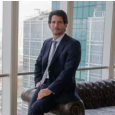You've been with Despegar since before the IPO, participated in the IPO process, and now you have been acquired by Prosus. What is the narrative behind this evolution?
The acquisition by Prosus aligns with the growth strategy we set up during the IPO. While we haven't spoken much publicly about this transaction, we see it as an opportunity to enhance our expansion beyond Latin America. Prosus, as an investor group, has the financial capacity and global reach that can accelerate our growth internationally, which was always part of our long-term vision.
The travel industry still has significant room for growth and consolidation. The pandemic slowed down many acquisition opportunities, though we did manage to acquire five companies. However, we were unable to expand outside of Latin America at the scale we had envisioned. With Prosus, we now have the ability to pursue larger acquisitions and further our global presence.
Argentina has undergone a significant political and economic shift. How do you position Despegar to navigate these changes, particularly in the tourism sector?
The tourism industry in Argentina is underdeveloped compared to other countries. If we analyze outbound travel, we see a rebound in international travel, although it has not yet returned to pre-pandemic levels due to taxes and exchange rate fluctuations. While this sector is recovering, it remains heavily taxed and constrained by economic policy.
On the inbound and domestic tourism side, Argentina has immense untapped potential. To illustrate this, I was recently in Palma de Mallorca, a relatively small location that hosts major hotel chains like Meliá, Riu, and Palladium. Palma’s airport has 40 luggage belts, whereas Argentina lacks the infrastructure to develop tourism at that scale. The volatility of Argentina's economic policies discourages investment in hotels and tourism infrastructure, as businesses cannot operate under unpredictable conditions where incentives change overnight.
Having operated in such a challenging environment, does that give you a competitive advantage when expanding to other markets?
Absolutely. Operating in Argentina has forced us to be highly adaptive and resilient. We are the only online travel company in the country that allows users to pay in pesos at dollar prices, and this is largely due to our ability to navigate complex economic conditions. The persistent presence of the country tax incentivizes payments in dollars, which we have successfully integrated into our technology and payment systems.
However, while this ability gives us a competitive advantage, it also highlights a fundamental macroeconomic inefficiency. Instead of creating value for consumers, we are forced to focus on currency arbitrage strategies. This is a systemic failure, as it diverts resources from innovation to merely keeping up with government policies. Businesses in Argentina can either align with the government or stay ahead of regulatory changes. The latter is a difficult but necessary strategy for survival.
Do you believe the private sector can drive Argentina’s economic recovery, given the new administration's pro-market stance?
It’s important to distinguish between two types of private-sector actors in Argentina. On one hand, there are genuine entrepreneurs and business leaders who generate value for their companies while also benefiting the country. Many of Argentina’s most successful tech entrepreneurs, such as those behind the country’s unicorns, built their businesses independently of government contracts or privileges. These companies are willing to invest, grow, and innovate despite the challenges.
On the other hand, there are business groups that have historically relied on close ties to the government to thrive. These groups have exploited economic instability to their advantage rather than contributing to real development. The challenge for Argentina is to foster a private sector that competes on merit rather than political connections. If the country genuinely opens to the world, the productive and competitive private sector will drive growth. However, whether this transformation happens remains to be seen.
Despegar has focused heavily on technology, particularly with AI-driven solutions like Sofia, your virtual assistant. What role will technology play in the company’s future?
Technology is central to our strategy, particularly in improving user experience and operational efficiency. AI is transforming the way people plan and book travel, and we are investing heavily in making our platforms more intuitive and responsive to customer needs. From the initial planning stages to post-sale services, AI enables us to deliver a more personalized and efficient experience.
Our AI-powered virtual assistant, Sofia, has been recognized as the best in the world by industry leaders like Booking.com and Expedia. This recognition is based on the interface, response speed, and quality of assistance. An American investment bank, B. Riley, also named our AI technology among the best in the travel industry. We see AI as a key driver of our growth and differentiation in the market.
Despegar has maintained impressive growth despite challenging economic conditions. What has been the key to sustaining this trajectory?
A high level of ambition and a commitment to global expansion have been critical to our sustained growth. Argentina now represents only 15% of our business, which is a direct result of a strategic decision to expand beyond our home market. Early on, we recognized that relying solely on Argentina would be too risky, and we actively pursued growth in other regions. This decision has provided us with resilience against local economic instability.
Having a global outlook not only protects us from domestic turbulence but also ensures we continue to scale in a meaningful way. It allows us to maintain stability while also taking advantage of opportunities in rapidly evolving global travel markets.
If you had the opportunity to speak directly with President Javier Milei, what would you ask him to prioritize for the industry?
I don’t believe in lobbying for industry-specific benefits. What Argentina needs is broad economic normalization—lower taxes, reduced government spending, and a stable institutional framework. The current administration is implementing changes, but many of them are being done through executive decrees, which means they can easily be reversed by the next government. This lack of long-term stability discourages investment.
What Milei should focus on is building institutional strength. Instead of relying on temporary regulatory changes, there needs to be a consensus-driven approach that creates lasting reforms. If businesses and investors believe these reforms will endure, they will be more willing to commit long-term capital to the country. Additionally, moves like appointing close associates to judicial positions undermine confidence in institutional integrity. Argentina is still paying the price for past governance mistakes, and unless these structural issues are addressed, economic growth will remain fragile.





